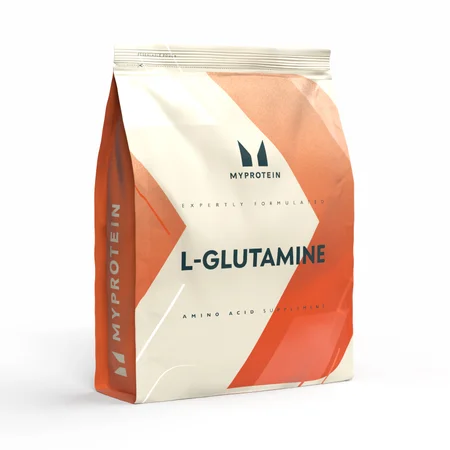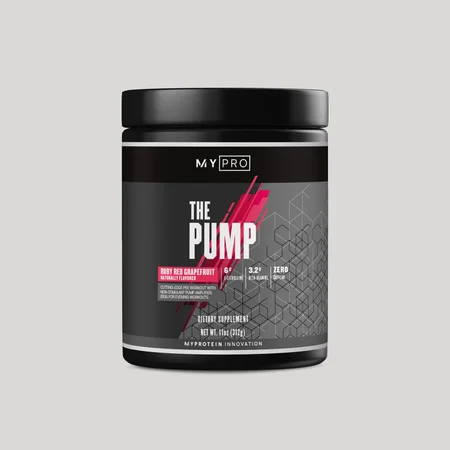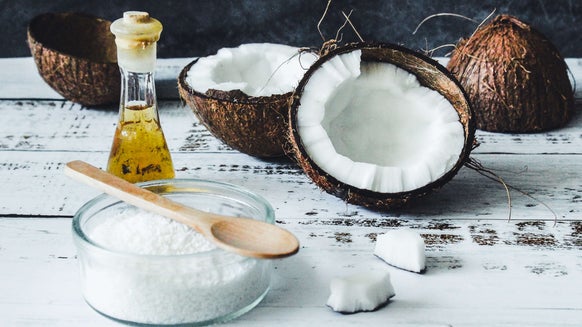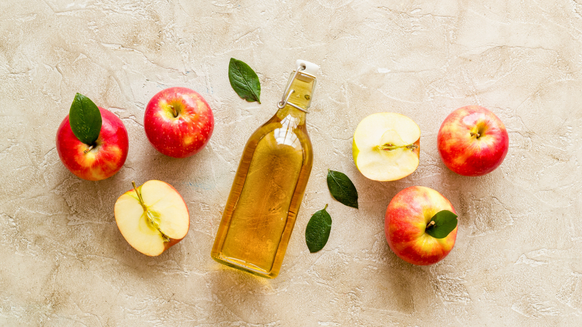
L-Glutamine is produced by the body and available in everyday foods, but is also a popular supplement due to its potential health and performance benefits. Glutamine exists in two different forms, L-glutamine and D-glutamine, which only vary in molecular structure. In this article we’ll be focusing on the specific health benefits and side effects of L-glutamine.

What is L-Glutamine?
This need for additional glutamine, when our body is using it in higher amounts, supports the argument that L-glutamine is actually “conditionally essential” — meaning there are times when it’s necessary to consume more than what our body produces.
It makes sense that making our muscles work hard would demand more L-glutamine — since they’re responsible for creating it in the body. Instances during which our body comes under stress means it requires additional glutamine. These include severe illness and exercise.
Food Sources
Dietary sources of L-glutamine include a variety of foods, from animal products like eggs and beef to vegetable sources like rice or corn. Due to this wide availability in food, following a healthy diet can provide adequate L-glutamine for most people. However, during exercise, L-glutamine production changes based on the type and intensity of activity.
Because L-glutamine is crucial for muscle building, increasing our levels via supplementation after exercise can be beneficial. L-glutamine supplementation may have a greater benefit for those who have less protein in their diets, like vegans or vegetarians. This is because they may naturally have less of this amino acid.
Many sports supplements are targeted towards strength training, but L-glutamine has potential benefits for both power exercise and endurance exercise.
Benefits
1. Quick Recovery
Research has shown that athletes can benefit from L-glutamine supplementation to decrease muscle soreness and improve recovery time.
This amino acid plays a crucial role in controlling glucose (energy) uptake by the muscles after exercise, which can help restore their energy stores for your next workout. When your muscles have optimal glucose stores, you perform better and take longer to fatigue.
Long periods of strenuous training have been shown to decrease blood glutamine levels, making L-glutamine potentially a very useful supplement for your post-workout nutrition plan.
2. Increased Lean Body Mass and Power
Studies have shown additional potential benefits, such as:
- Limited strength loss and reduced muscle soreness
- Feeling less fatigued
- Longer time until exhaustion in endurance exercise
3. Weight Loss
Coupled with increased body mass often comes weight loss — muscle tissue burns more than fat tissue, and increases your metabolism over time. Diets high in protein and amino acids like glutamine are more filling because they slow down digestion and signal to your brain that you are full - potentially reducing overall calorie intake.
Glutamine has also been shown to help with blood sugar regulation and prevention of obesity after consistent supplementation.
4. Boost in Immunity
Athletes who follow intense training schedules tend to have weakened immune systems due to the constant physical stress of high-intensity exercise.
Dosage
Intakes of 20-30g of glutamine or 0.65g/kg of body mass have been used in research studies and not shown any ill effects in short term use. However, you likely only need 3-5 grams daily to meet your body’s needs.
Timing
Potential Side Effects
There are limited potential side effects of taking L-glutamine, as it’s both made by the body and present in many foods. However, long term supplement use of glutamine may have impacts that we don’t fully understand. Amino acids like glutamine are transported through the body by specific systems, and often several amino acids compete for the same transporters. If there is a constant surplus of glutamine, it may be more difficult for the body to adequately use competing amino acids.
If you’re unsure about the potential side effects L-glutamine might have on you, always talk to your GP before taking them.
Take Home Message
L-glutamine is an important amino acid that plays many roles in our bodies regardless of our level of exercise. However, the stress that exercise puts on our body can deplete our L-glutamine levels, making it a useful supplement for athletes.
READ THESE NEXT:

Claire is a Registered Dietitian through the Academy of Nutrition and Dietetics and a board-certified Health and Wellness Coach through the International Consortium for Health and Wellness Coaching. She has a Bachelor of Science in Biology and a Master’s degree in Clinical Dietetics and Nutrition from the University of Pittsburgh.
Talking and writing about food and fitness is at the heart of Claire’s ethos as she loves to use her experience to help others meet their health and wellness goals.
Claire is also a certified indoor cycling instructor and loves the mental and physical boost she gets from regular runs and yoga classes. When she’s not keeping fit herself, she’s cheering on her hometown’s sports teams in Pittsburgh, or cooking for her family in the kitchen.
Find out more about Claire’s experience here.
- Gleeson, M. (2008). Dosing and efficacy of glutamine supplementation in human exercise and sport training. The Journal of nutrition, 138(10), 2045S-2049S.
- Holecek, M. (2013). Side effects of long‐term glutamine supplementation. Journal of parenteral and Enteral Nutrition, 37(5), 607-616
- Hall, J. C., Heel, K., & McCauley, R. (1996). Glutamine. British Journal of Surgery, 83(3), 305-312.
- United States Department of Agriculture Agricultural Research Service. (2019, January 29). USDA Food Composition Databases Nutrient List. Retrieved from https://ndb.nal.usda.gov/ndb/nutrients/index
- Legault, Z., Bagnall, N., & Kimmerly, D. S. (2015). The influence of oral L-glutamine supplementation on muscle strength recovery and soreness following unilateral knee extension eccentric exercise. International journal of sport nutrition and exercise metabolism, 25(5), 417-426.
- Iwashita, S., Williams, P., Jabbour, K., Ueda, T., Kobayashi, H., Baier, S., & Flakoll, P. J. (2005). The impact of glutamine supplementation on glucose homeostasis during and after exercise. Journal of applied physiology.
- Lehmkuhl, M., Malone, M., Justice, B., Trone, G., Pistilli, E. D., Vinci, D., … & Haff, G. G. (2003). The effects of 8 weeks of creatine monohydrate and glutamine supplementation on body composition and performance measures. The Journal of Strength & Conditioning Research, 17(3), 425-438.
- Street, B., Byrne, C., & Eston, R. (2011). Glutamine supplementation in recovery from eccentric exercise attenuates strength loss and muscle soreness. Journal of Exercise Science & Fitness, 9(2), 116-122.
- McCormack, W. P., Hoffman, J. R., Pruna, G. J., Jajtner, A. R., Townsend, J. R., Stout, J. R., … & Fukuda, D. H. (2015). Effects of L-alanyl-L-glutamine ingestion on one-hour run performance. Journal of the American College of Nutrition, 34(6), 488-496.
- Melis, G. C., ter Wengel, N., Boelens, P. G., & van Leeuwen, P. A. (2004). Glutamine: recent developments in research on the clinical significance of glutamine. Current Opinion in Clinical Nutrition & Metabolic Care, 7(1), 59-70.
- Shao, A., & Hathcock, J. N. (2008). Risk assessment for the amino acids taurine, L-glutamine and L-arginine. Regulatory toxicology and pharmacology, 50(3), 376-399.









